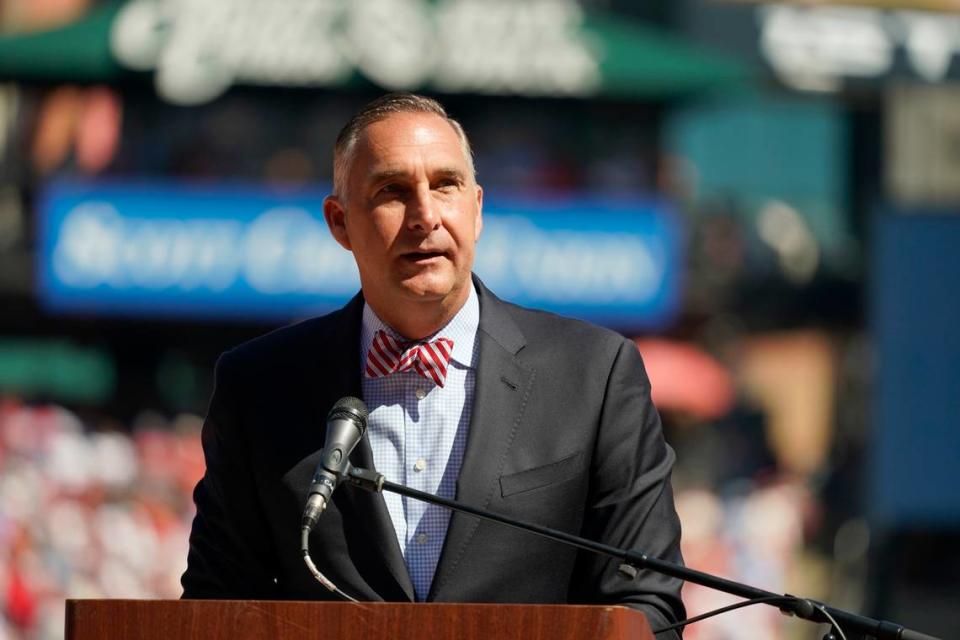Hapless Cardinals settle into June dead last in NL Central. What should fans expect next?
- Oops!Something went wrong.Please try again later.
- Oops!Something went wrong.Please try again later.
- Oops!Something went wrong.Please try again later.
- Oops!Something went wrong.Please try again later.
The baserunning blunder that cost the Cardinals a chance to take the lead in the top of the eighth inning of Monday’s game in Texas was nearly a note-perfect microcosm of the season to date.
An opportunity to go ahead finished up a little bit short because they simply couldn’t stay out of their own way, and when the smoke cleared, no one knew what to do next.
Nolan Gorman certainly hung up at second a bit too long and Nolan Arenado certainly compounded measures by running with his head down and not maintaining awareness of where his teammates were, but ultimately no one did anything so far out of expectation as to be a problem by themselves.
It was only the combined efforts that coagulated into a train wreck and left the Cardinals vulnerable to being walked off — rather than shutting things down — in the bottom of the ninth.
After winning none of their first four games in June coming out of a two-day break, the last-place Redbirds find themselves eight back of Milwaukee for first place in the NL Central and just half a game closer to Miami for the final Wild Card. The predictive metrics published by Baseball Reference and FanGraphs are converging on each other, settling with a slightly worse than 1-in-4 chance of this team making the postseason.
A week is gone in June. More than a third of the season has passed. It’s no longer early. They are obliged to figure it out and rapidly.
If they don’t, though, it’s difficult to say what might come next. For years, part of why the Cardinals have been looked upon as one of the model organizations in the game is their stability, and the predictability of their decision making was part and parcel of that. If nothing else, for better or worse, they trusted their system and trusted their instincts, and from that flowed reliable decision making.
It was only when things spun out of control that that predictability came into question. Mike Matheny lost his job after two straight years of missing the playoffs and in the midst of stepping in every conceivable pothole when it came to managing his relationships in the clubhouse. Mike Shildt lost his after — in the opinion of some who saw it up close — overexerting his authority and creating a challenging working environment for himself because of some of those fractured relationships.
Oli Marmol was supposed to be the solution to those problems and in large part has been. A cohesive staff environment like the one he’s created should be one in which players — fully bought in — are able to thrive, and a front office eager to collaborate (or at least make sure its fingerprints are visible) should benefit from the same.
Instead, without a clear rudder, leadership in the baseball operations department has parceled out increasingly infrequent media availability. Marmol is left to answer for roster decisions over which he doesn’t have full control, and the team puts off the air of careening from one hurdle to the next without putting together a comprehensive plan to get through the set of them.

Mixed messaging, roadblocks vs. speedbumps
The muddled transactions around Taylor Motter’s demotion and re-promotion in April were one warning flag. The inconsistent messaging around Willson Contreras — which had the seeming result of creating a scapegoat out of a player who should be the team’s heartbeat — was more serious.
Now, decisions like holding a roster spot for a third catcher who got two plate appearances in three weeks and scoffing at the possibility of calling up a positionless slugger from the minors only to be forced into the same give off the perception of a team reacting to its circumstances rather than creating them.
The Cardinals haven’t lost in a long time, and it’s not clear that they know how to do so.
Players, of course, deserve their share of blame. Contreras has gone ice cold and Arenado’s uneven recovery from a poor start has still left the offense wanting. But it remains difficult to look at the players in their current positions and see significant underachievement.
The flaws among the starters were known; none is performing far outside reasonable projections for him. The bullpen has been somewhat unstable, but it’s a bullpen. They do that. Lars Nootbaar’s injuries have been unfortunate and neither Dylan Carlson nor Tyler O’Neill has a spotless injury history, to say the least. Why would their missing time constitute a major roadblock as opposed to an expected speed bump?
What’s next? Anyone’s guess
Ultimately, for the Cardinals, the issue is not that the team is bad, but rather that it’s not much worse than could have been reasonably anticipated. On the scale of potential outcomes, sometimes all the negative outliers hit at once. It’s the job of management to hedge against those, not throw up hands and refuse to adjust when they arise.
John Mozeliak insists still the team doesn’t plan to sell at the trade deadline. Joe Maddon is on television not even hiding his open politicking for the manager’s seat. All the while, the team is struggling through a road trip, scrambling to get back home.
It’s hard to see much reason to believe the next fork in the schedule’s road will be much different than any they’ve passed so far. Still they’ll press on past it; it seems they’re not sure how to do much of anything else.

